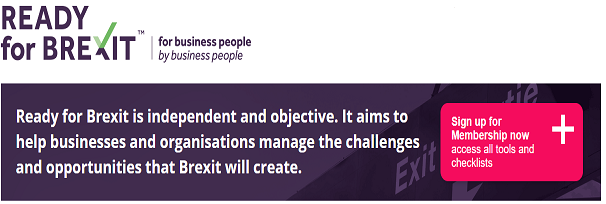
Thank goodness for backbench MPs and the European Union. Without their efforts, the UK would by now have left the EU without any trade deals, or ongoing relationship with it’s biggest export market. And as the Duke of Wellington said in another context, “It was a damn close-run thing”:
- In a historic vote, MPs decided by just 1 vote to force the government to ask for a longer extension
- The EU Council argued into the night on its response, but decided to give the UK “a second chance”
The problem was well expressed in a tweet by former Brexit Secretary, David Davis, on Friday morning:

His tweet completely ignored the views of all the main business organisations and trade unions, who had spent weeks trying to point out that issuing government statements and Guidance Notes was not the same as actually being prepared, as The Guardian noted:
“Frances O’Grady, the general secretary of the TUC, and Carolyn Fairbairn, the CBI’s director-general, wrote last month before the crunch EU summit in Brussels: “Our country is facing a national emergency. Decisions of recent days have caused the risk of No Deal to soar. Firms and communities across the UK are not ready for this outcome. The shock to our economy would be felt by generations to come.””
On Friday, confirming their lack of understanding of business needs – and against the advice of senior civil servants – ministers decided to completely stand down No Deal preparations. Yet as the independent Institute for Government have warned:
“Despite the delay, a No Deal exit is still very much on the table, either on 31 May or 31 October… Businesses and the public should not be left to read between the lines of individual departmental press notices.”

It is therefore critical that UK and EU27 businesses now take the opportunity of the extension to understand and prepare for the changes that will affect them if the UK does leave the EU. For all the talk of a new referendum, this is still the law of the land.
Our surveys at Ready for Brexit have consistently shown that 80% of small businesses weren’t ready for Brexit. Some had stockpiled some essential goods, but only around one fifth had actually thought through a detailed plan. As a result, many people have had sleepless nights in recent weeks as they realised the UK might well be leaving with No Deal.
Now that the UK has an extension, it is time to stop panicking and start preparing. None of us can afford to be complacent – No Deal remains the default position and businesses need to know how Brexit will affect them in key areas for their future:
- Customs, Tariffs and Regulations. No one has needed to fill out Customs Declarations for EU trade for 25 years. HMRC has warned that following Brexit, businesses may need to make 400 million Customs Declarations at an expected cost of £32.50 each. Compliance with Rules of Origin could easily cost more, if legal advice is needed. Companies need to identify how Customs and Regulatory requirements could impact their business and plan to put the correct procedures in place
- Supply Chains. Will your business be affected by interruptions in supply chains following Brexit? You need to audit your supply chain partners to identify potential weak links. It only takes one missing item to shut down a production line. And think about what may happen to your cash flow if forecast delays take place at the ports
- Sales Agreements. Do you have Material Change clauses in your commercial contracts? You need to check out key areas such as your ability to pass on the costs of tariffs, customs delays and exchange rate movements, as well as the impact of possible regulatory changes. Governing contract law also needs checking as the UK will no longer be a member of the EU
- Employment. You need to understand how the status of UK-employed EU citizens may change and check out the position of UK staff working temporarily or permanently in EU countries. Don’t forget basic areas such as whether professional qualifications obtained in the UK will still be valid in the EU after Brexit, and the possible need for international driving licences

We have all had a lucky escape in the past few days. But we can’t rely on our luck holding. Planning now for whatever may happen in the next few months may well save you months of heartache later on.
This is why, with some highly experienced colleagues, I helped set up Ready for Brexit. As I wrote here in June:
“We are particularly concerned that many small and medium-sized businesses (SMEs) – the backbone of the European economy – are failing to plan ahead for Brexit’s potential impact.”
We can all hope that politicians now step back, and work together to avoid the disaster of a No Deal at the end of May or October.
But hope is not a strategy – particularly when the future of your business may be at stake. If you need detailed help in the form of Brexit Checklists and planning tools, they are all there on the Ready for Brexit site.
